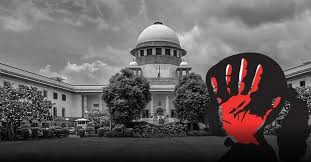
Supreme Court Orders Timely Compensation for Rape Victims; POCSO and Sessions Courts Must Act Swiftly
Apex Court says compensation is a victim’s right, not charity
Directions aim to strengthen justice system and support survivors of sexual violence
By Our Legal Reporter
New Delhi: November 08, 2025:
In a landmark ruling, the Supreme Court of India has directed all POCSO (Protection of Children from Sexual Offences) Courts and Sessions Courts to ensure that rape victims receive compensation promptly. The Court stated that compensation is not an act of charity but a legal entitlement under the law.
Also Read: Delhi High Court Rules Algorithm-Based Inventions Not Patentable Under Indian Law
This ruling comes amid widespread concern over delays in disbursing financial aid to survivors of sexual violence. The judgment reinforces the idea that justice must include rehabilitation and dignity for victims.
Background of the Case
The Court was hearing petitions that exposed inconsistencies in victim compensation across different states. Many survivors waited years or were denied aid due to red tape. The Court cited Section 357A of the Code of Criminal Procedure (CrPC), which guarantees compensation to crime victims, and the POCSO Act, which mandates special support for child victims.
Also Read: Supreme Court Calls for Blockchain in Land Registrations to End Property Purchase Troubles
Key Directions of the Supreme Court
- Mandatory Compensation: Every case of rape or sexual assault must include compensation orders.
- Timely Disbursement: Authorities must release funds without unnecessary delay to address survivors’ urgent needs.
- Uniform Guidelines: All states should adopt a consistent framework to ensure fairness across India.
- Victim-Centric Approach: Compensation is part of restorative justice, helping victims rebuild their lives.
Also Read: Legislature Cannot Override Court Judgments, But Can Fix Legal Defects Through Amendments
Why This Matters
Survivors of sexual violence often face trauma, stigma, and economic hardship. The ruling ensures that compensation serves as real support by covering:
- Medical Support: Funds for healthcare and counselling.
- Rehabilitation: Assistance with education, housing, or livelihood.
- Recognition of Rights: Legal acknowledgment of harm and accountability.
Legal Context
Also Read: High Courts Cannot Hold Mini Trials to Quash FIRs; Omissions in Complaints Not Enough
- Section 357A CrPC: Empowers states to fund victim compensation schemes.
- POCSO Act, 2012: Ensures special protection and assistance for children facing sexual abuse.
- Past Judgments: Recognized compensation as part of the right to life under Article 21 of the Constitution.
This ruling strengthens the existing framework by making victim compensation a mandatory legal duty rather than a matter of discretion.
Reactions from Legal Experts
Lawyers and activists have welcomed the verdict. They believe it will reduce disparities among states and offer consistent justice. Women’s rights groups highlighted that timely compensation enables access to healthcare and education for survivors. However, experts cautioned that implementation must include speedy trials, victim protection, and psychological counselling for holistic justice.
Challenges Ahead
- State Compliance: States have different compensation schemes, making uniformity tough initially.
- Administrative Delays: Bureaucratic processes could still slow fund release.
- Awareness: Victims and families need to be informed about their rights to claim compensation.
Effective monitoring will be key to ensuring that the Court’s directives translate into ground-level justice.
Implications for Future Cases
- Consistency: Courts nationwide will follow a unified compensation framework.
- Accountability: States will be responsible for compliance and timely payment.
- Empowerment: Victims will have a stronger foundation to claim their rights.
Conclusion
The Supreme Court’s ruling is a milestone for victim rights jurisprudence in India. By declaring compensation as a legal right and not a favor, the Court has redefined the justice process for survivors of sexual violence. When effectively enforced, this decision can transform how India ensures dignity, support, and justice for those most in need.
Also Read: Quick Checklist: Start a Company in the USA from India